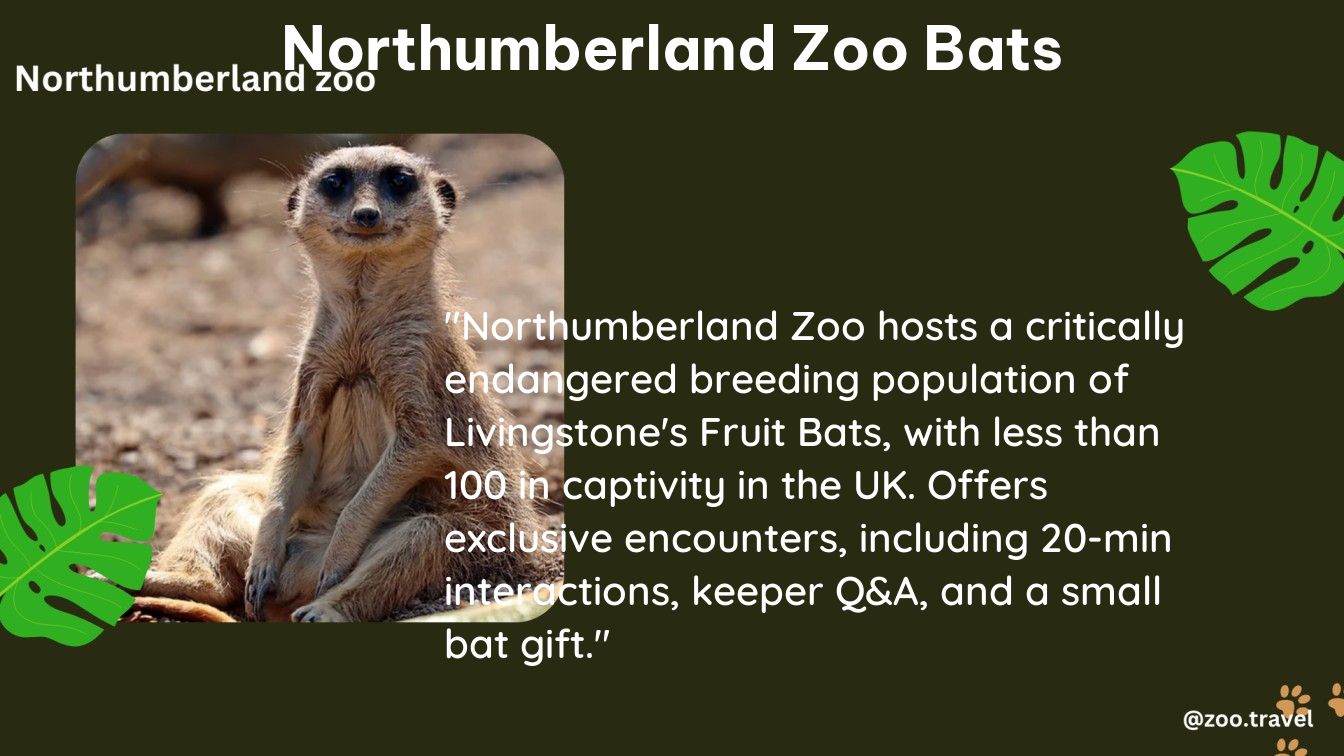Northumberland Zoo is home to a breeding population of critically endangered Livingstone’s Fruit Bats (Pteropus livingstonii), the third-largest bat species in the world with a wingspan of 1.2 meters. These bats are native to the Comoros Islands and are at risk of imminent extinction due to deforestation and tropical storms. The zoo is actively working to increase the captive population of these bats and supports Dahari NGO, which is dedicated to sustainable reforestation, bat ecology, supporting farmers, education, and roost protection schemes in the Comoros Islands.
The Livingstone’s Fruit Bat: A Critically Endangered Species
Livingstone’s Fruit Bats are native to the Comoros Islands, a small archipelago in the Indian Ocean off the eastern coast of Africa. These bats are the third-largest bat species in the world, with a wingspan of up to 1.2 meters. They are critically endangered due to a variety of threats, including:
-
Deforestation: The primary threat to Livingstone’s Fruit Bats is the loss of their natural habitat due to deforestation. The Comoros Islands have experienced significant deforestation over the past few decades, as land is cleared for agriculture and development.
-
Tropical Storms: The Comoros Islands are also vulnerable to frequent tropical storms, which can destroy the bats’ roosting sites and food sources.
-
Hunting and Poaching: In some parts of the Comoros Islands, Livingstone’s Fruit Bats are hunted for their meat or captured for the pet trade.
Northumberland Zoo’s Conservation Efforts

Northumberland Zoo is actively working to conserve the Livingstone’s Fruit Bat population. The zoo is home to a breeding population of these bats and is supporting the Dahari NGO in the Comoros Islands. Dahari’s conservation efforts include:
- Sustainable Reforestation: Dahari is working to restore the native forests of the Comoros Islands, providing critical habitat for the Livingstone’s Fruit Bat.
- Bat Ecology Research: Dahari is conducting research to better understand the ecology and behavior of the Livingstone’s Fruit Bat, which is essential for effective conservation efforts.
- Supporting Farmers: Dahari is working with local farmers to promote sustainable agricultural practices that minimize the impact on the bats’ habitat.
- Education and Outreach: Dahari is engaging with local communities to raise awareness about the importance of bat conservation and the threats facing the Livingstone’s Fruit Bat.
Visitor Experiences at Northumberland Zoo
Northumberland Zoo offers several unique experiences for visitors to learn about and interact with the Livingstone’s Fruit Bats:
Fruit Bat Experience for One
This 20-minute encounter allows visitors to spend time in the bats’ enclosure, receive a small bat-themed gift, and learn from a bat keeper. The experience is available for adults and children over the age of 10, with children between 10 and 15 requiring a spectating parent or guardian.
Bat Encounters
The zoo is also launching a new Bat Encounters program, which will provide visitors with exclusive opportunities to interact with the critically endangered Livingstone’s Fruit Bats.
Mobile App and Live Webcams
Northumberland Zoo’s mobile app allows visitors to stay up-to-date with the latest information about the Livingstone’s Fruit Bats, including their names and dates of birth. The app also provides access to live webcams, allowing visitors to observe the bats in their enclosure.
Awards and Recognition
Northumberland Zoo has received recognition for its efforts in conservation and tourism. In 2024, the zoo won gold at the Northeast Tourism Awards in the categories of ‘Large Visitor Attraction’ and ‘Sustainable Tourism’. This recognition highlights the zoo’s commitment to providing an exceptional visitor experience while also prioritizing the conservation of endangered species like the Livingstone’s Fruit Bat.
Conclusion
Northumberland Zoo is dedicated to the conservation and breeding of the critically endangered Livingstone’s Fruit Bat. Through its various visitor experiences, conservation efforts, and partnerships with organizations like Dahari, the zoo is playing a vital role in protecting this unique species and raising awareness about the importance of bat conservation.
References:
– Livingstone’s Fruit Bats – Northumberland Zoo, https://www.northumberlandzoo.co.uk/animals-1/livingstone%27s-fruit-bats
– Livingstone’s Fruit Bats – Northumberland Zoo, https://www.northumberlandzoo.co.uk/livingstonesfruitbats
– Zoo News | Northumberland Zoo, https://www.northumberlandzoo.co.uk/blog
– Fruit Bat Experience for One – Northumberland Zoo, https://www.northumberlandzoo.co.uk/product-page/fruit-bat-experience-for-one
– Zoo Update – Bats arrive and FLY around new Exhibit – YouTube, https://www.youtube.com/watch?v=16KeD4fC2QA
